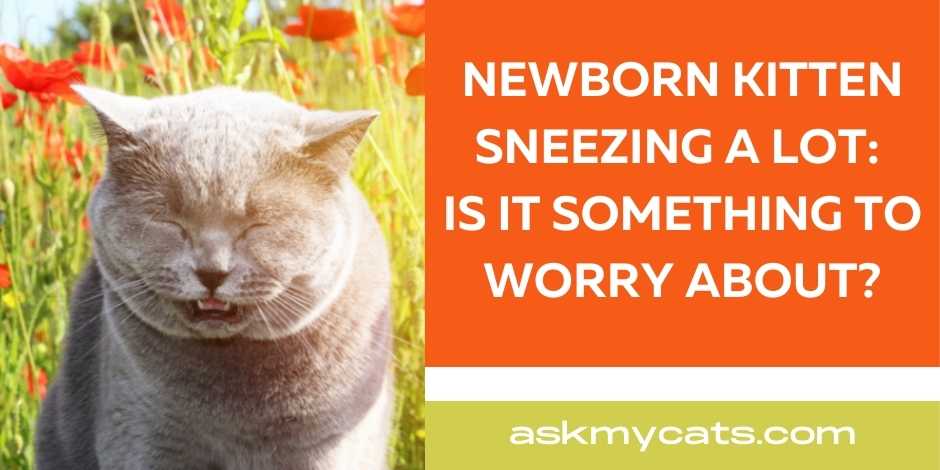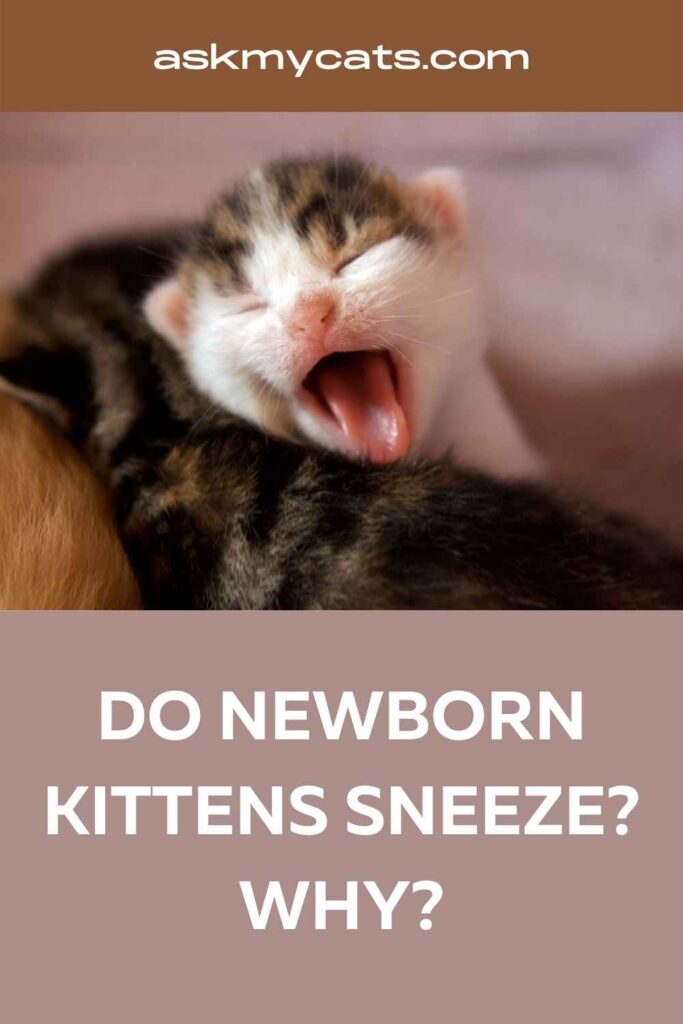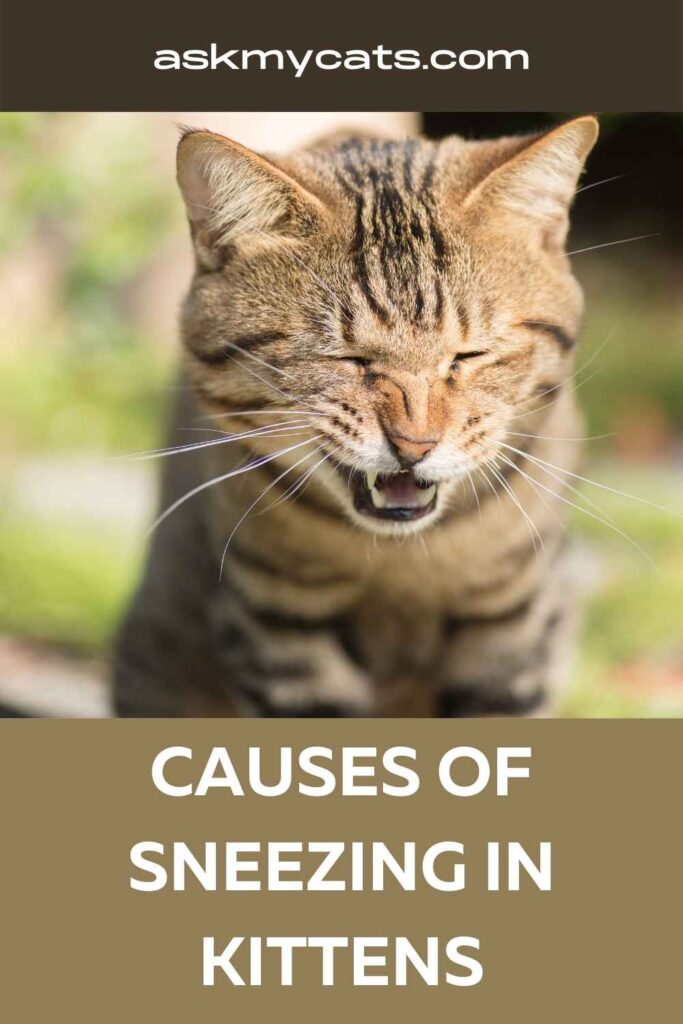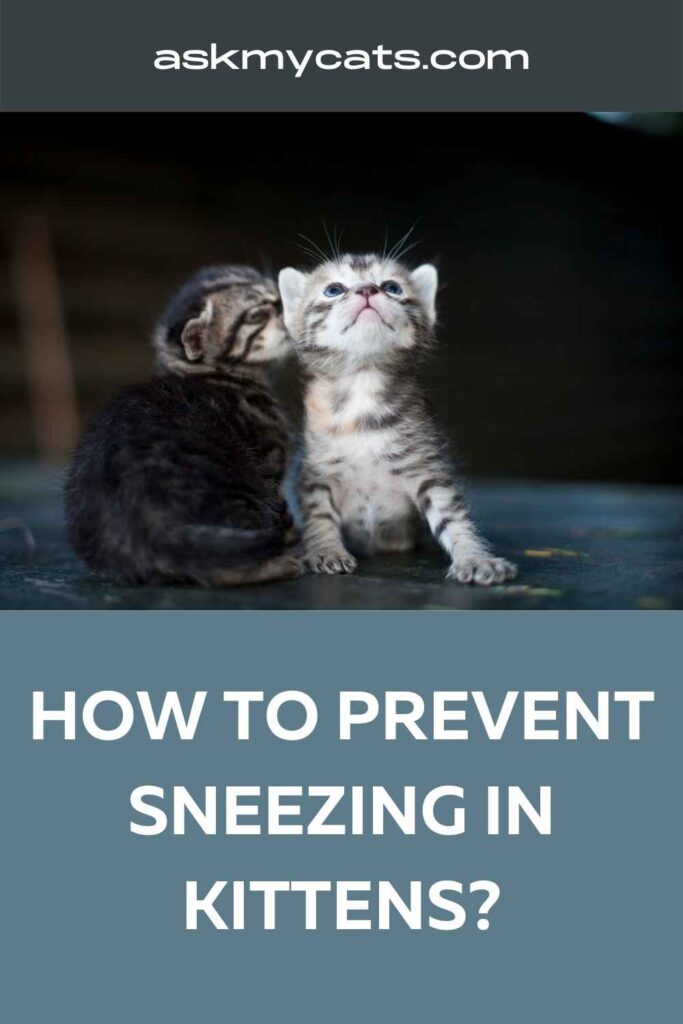Kittens are really very cute. It is an undeniable fact. And they become all the cuter when they do some silly actions like tumbling while walking, trying a front roll, or even sneezing.
That small “ah-choo!” with their tiny noses being all scrunched up momentarily –is truly a cute picture to have in mind.
That first sneeze is cute. A second one may be cuter. But when your kitten sneezes continuously, it will naturally make you feel worried and concerned about your kitten’s health. You may wonder if there’s something medically wrong with the kitten.
Don’t worry, you don’t have to panic. Read along as we see the possible reasons behind kittens’ sneezing, some associated symptoms, as well as when you should see the vet.


Give Your Cat the Perfect Day
Get the Free Ebook!
Do Newborn Kittens Sneeze? Why?

An occasional random cough or sneeze in a cat is natural and should not be a reason for concern.
Sneezing in kittens, just as in people, is an abrupt burst of air via the nose and mouth – pretty frequently the body’s reaction to irritants in the nasal passages. Kitties might even sneeze as a result of excitement or movement.
Although, if your cat’s sneeze lingers for a substantial period of time, or if other indications have appeared with the sneezing, you should consult with your vet to determine whether medication or treatment is required.
Sneezing in kittens can occur for a variety of causes. The following are some of the most common reasons for kitten sneezing:
- Odd or noxious smells, such as from cleaning products or cooking spicy food
- Airborne irritants, such as dust, dusty cat litter, pollen, perfume, or cigarette smoke
- Upper respiratory infections
- Inflammation of the nasal cavity or sinuses
- Foreign body in the nasal passages, such as a blade of grass or piece of a feather
- Excitement or sudden movement
- Allergic rhinitis or asthma (more common in adult cats)
- Dental problems causing inflammation and swelling to impact the sinuses (more common in adult cats)
- Cancer (rare)
When Should I Worry About My Kitten Sneezing?
Understanding the reason for your kitten’s sneezes might be easy or require the assistance of your veterinarian.
Observe the surroundings when your kitten sneezes
When your kitty sneezes, consider the surroundings: Did someone in your household recently use a disinfectant, sanitizer, perfume, or any other aerosol, or have you been starting to catch up on dusting?
In these circumstances, your kitten’s nasal passages were most likely just slightly inflamed, and the tickling triggered the sneeze. Once the air is cleared, the sneezing should cease immediately.
If the sneeze continues, it is likely that something more serious is at work.
Check whether there is a connection to the time of day or persons around (such as someone who smokes or usually wears a lot of scents) when your kitty sneezes, or whether it is consistent.
However, your kitty is most likely suffering from an upper respiratory illness.
Also, check out reasons for Why Is My Pregnant Cat Sneezing So Much?
Causes Of Sneezing in Kittens

If your cat sneezes frequently, your vet may suggest a reason based on a study of your cat’s symptoms. Infection is one of the most common reasons of sneeze.
To confirm an infection, the vet may take a sample from the mouth, throat, eyes, or nose and send it to a lab. Other typical causes of sneeze in cats include inhaled irritants or allergens.
1. Upper Respiratory Disease
Upper respiratory infections (URIs) are prevalent in kittens, particularly if the kitten hails from a high-density environment such as a shelter or rescue center or was rescued outdoors.
These infections, which can be caused by viruses, bacteria, fungus, or a combination of pathogens, are frequently very infectious.
Feline immunodeficiency virus (FIV), feline leukemia (FeLV), feline infectious peritonitis (FIP), chlamydia, Bordetella, and mycoplasma are among the other illnesses that can induce sneeze.
There are simple tests for FIV and FeLV, and it is strongly advised to test all new kittens before bringing them into your house to avoid the growth of these illnesses in your other pets.
If your kitten is at risk for illness, several of these diseases can be prevented by vaccination.
2. Rhinitis and Sinusitis
Sinusitis and rhinitis (inflammation of the nasal passages and sinuses) can happen on their own or as a consequence of an upper respiratory infection.
Cigarette smoke, cleaning chemicals, pollen, dust, mold, and perfume, among other things, can irritate the fragile tissues in these regions. A foreign body stuck in the nasal cavity, such as grass clippings or hair, can also cause irritation.
Symptoms are identical to those of an upper respiratory infection but generally tend to involve nasal discharge as well as some sneezing, sniffling, or snorting.
Because of the itchiness, your kitten may paw at his nose. In moderate cases, nasal discharge is clear and flowing; however, the inflammation renders your cat susceptible to subsequent bacterial or fungal infections, which can also cause the discharge to thicken and look yellow, green, or even bloody.
If your vet suspects rhinitis or sinusitis (or rhinosinusitis if both regions are affected), he or she will most likely take a sample to test for infectious pathogens. This will help your veterinarian to select the appropriate meds to treat any infection.
3. Asthma and Allergies
These disorders are more common in adult cats, but can also occur in kittens.
Cats with asthma often have persistent coughing and sneezing, which can make breathing difficult. Symptoms may worsen or diminish during the allergy season or when cats are allowed to go out.
Asthma in cats can have allergens and can be caused by pollen, certain plants and grasses, and even allergens such as mites.
Due to environmental allergies, most cats show skin lesions, but not the sneezing or itchy eyes that humans receive.
Asthma in cats is often diagnosed by testing and x-rays of the cat’s lungs. Blood tests can be used to identify allergies, but skin testing is still the holy grail. Treatment normally consists of anti-inflammatory medicines and, if allergies are present, immunotherapy.
4. Vaccinations
Your kitten may experience brief sneezing after having a respiratory illness immunization.
Vaccines administered intranasally, or through the nose, are more likely to cause this.
What causes this to happen?
Vaccines function as training wheels for your kitten’s immune system, exposing it to a weakened or synthetic version of a virus in order for the immune system to produce antibodies to battle it.
Some immunizations may produce minor sickness symptoms. This will be resolved within a few days. When your kitten receives a vaccine, feel free to ask your veterinarian or the nurse if there will be any side effects you should be aware of.
Interesting Read: Can You Vaccinate A Pregnant Cat?
Sneezing and Associated Symptoms to Keep an Eye Out For
The symptoms that accompany sneezing in cats can be caused by a variety of illnesses and other issues. Among these signs are:
- Eye discharge, swelling, or ulcers
- Excessive nasal discharge, sometimes yellow or green in color (sometimes a sign of a bacterial infection)
- Fatigue or depression
- Fever
- Drooling
- Decreased appetite or weight loss
- Enlarged lymph nodes
- Wheezing or coughing
- Poor coat condition
- Trouble breathing
- Diarrhea
When Should I See the Vet for My Kitten’s Sneezing?
Kittens’ immune systems are not completely matured, making them susceptible to sickness.
If your kitten just sneezes once in a while and otherwise looks happy and healthy, you can keep an eye on him at home, but recurrent sneezing and any other symptoms require a trip to the veterinarian to address any underlying issues before they become more serious.
Make an appointment with your veterinarian if your kitten shows any of the following symptoms along with recurring and frequent sneezing:
- Sneezes frequently
- Has runny eyes
- Has a runny nose
- Sneezes blood
- Is lethargic or depressed
- Isn’t eating well
- Is losing weight
- Coughs
- Has enlarged lymph nodes (you can feel these under his chin)
Advanced Treatment for Chronic Sneezing in Kittens
The majority of kitten sneezing instances may be cured with supportive care, such as warming food to encourage eating, keeping the kitten warm, wiping the kitten’s nose and eyes as needed, using a humidifier, and administering subcutaneous fluids for hydration.
To reduce the chance of illness spreading, keep your sick kitten away from other cats and wash your hands after handling him.
Additional tests and treatment methods may be required in more severe situations. Blood tests, urinalysis, X-rays, CT or MRI scans, a nasal flush to collect samples, and a biopsy for assessment are among the diagnostic procedures available.
Very ill kittens may require a feeding tube and may need to be admitted to the hospital for intravenous fluids and more intense care.
In the case of persistent respiratory disorders, your veterinarian will devise a treatment plan to alleviate your cat’s discomfort. This may include daily treatments to prevent or reduce discomfort, as well as medications to be used when your cat is experiencing a flare-up.
The treatment is determined by the cause of the sneeze. In moderate situations, your veterinarian may advise you to use a humidifier to make your cat more comfortable.
Antibiotics, antihistamines, steroids, or fluids may be required in other circumstances. Cats that do not respond to medical therapy may require surgery in rare cases.
How to Prevent Sneezing in Kittens?
If your kitty is sneezing on and off and there are no other symptoms, you can begin by cleaning up his or her habitat. You may make a few simple changes:

- To check whether it makes a difference, stop using air fresheners, scented laundry detergents, perfumes, and smoking inside.
- Use caution while using disinfectants, especially if the kitten walks on the area you spray and then licks its paw pads. Many disinfectants include compounds that are toxic to cats.
A mixture of 3/4 cup basic bleach and a gallon of water produces a safe disinfectant for cleaning a litter box, as well as other surfaces such as kitchen worktops and sinks. It leaves a pleasant, clean aroma, so you shouldn’t need to use any more air fresheners.
- After any use of bleaching products or other cleaning chemicals, thoroughly rinse your kitty’s litter box and other kitty-frequented surfaces with plain water.
- Also, inspect your cat’s litter box. Some litters (especially clay litters) produce a great deal of dust when the cat scratches the sand in the box, which can aggravate allergy symptoms in both cats and people.
For a few days, keep a close check on your kitty. If it exhibits any other signs of an upper respiratory infection, such as watery eyes, sniffling, or coughing, or if it continues to sneeze after you’ve ruled out environmental causes, you should take it to the vet as soon as possible.
Frequently Asked Questions
My kitten is 2 weeks old and is sneezing. Should I be worried?
Your kitten most likely has an upper respiratory infection. They are highly contagious, and it is usual for kittens and cats that have recently been adopted from shelters to sneeze or have runny eyes and noses. 90% of feline upper respiratory infections are caused by calicivirus and herpes viruses. You should consult your vet to rule out any severe medical conditions.
When should I worry about my kitten sneezing?
If you see your kitten sneezing frequently, he may require veterinarian care and assistance. Coughing and sneezing are common symptoms of upper respiratory infections, but they can also be caused by other problems. Your kitten will be on the mend shortly with some supportive care at home and assistance from your veterinarian.
Final Words
If you see your cat sneezing now and then, it’s probably only responding to some dust or fur that has tickled its nose.
Remember that kittens’ noses are only a few inches above the floor, so if your floor is dusty, you may notice some sneezing. There is an easy solution to this problem: just dust and vacuum your floors more often.
If your cat experiences more than a moderate sneeze, allergies, foreign items in the nose, or upper respiratory infections are all possibilities. Without your knowledge, foreign things might become lodged in your pet’s nostrils.
A veterinarian can detect and securely remove foreign things. Sedation, nasal flushing, and/or endoscopy may be required.
